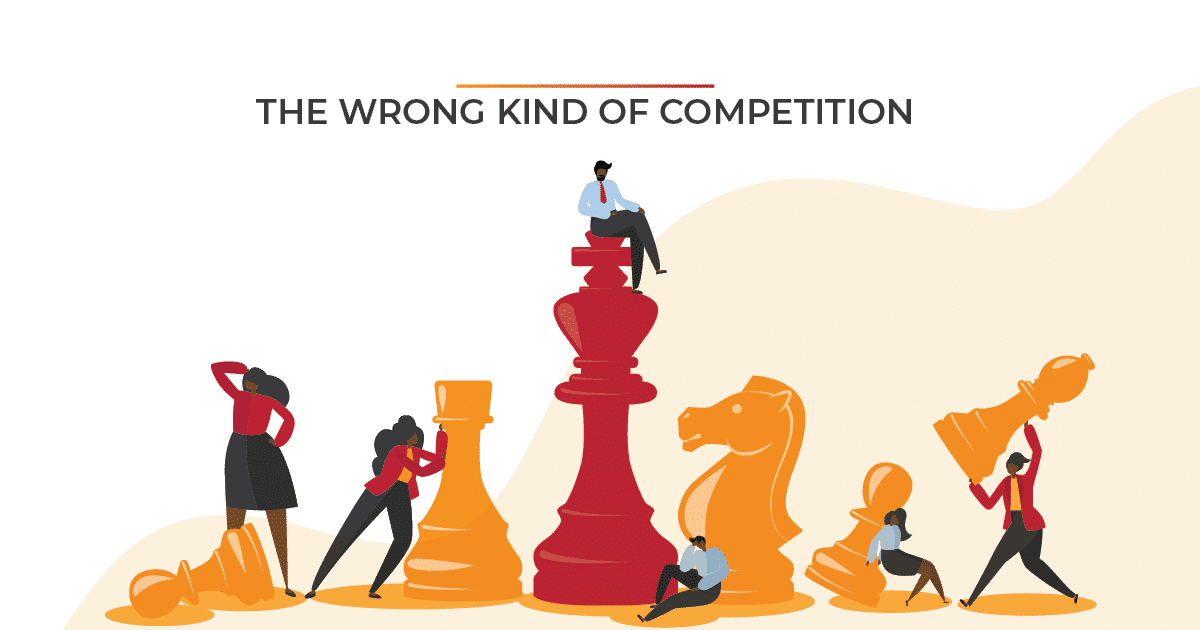Competition has often been said to be a helpful ingredient for innovation and creativity. However, while human beings are naturally competitive and while competition can indeed spur creativity, it is not always the best way to get people to bring out their best. A little competition is healthy but in many cases, it gets out of hand and what was once a noble way to get the company ahead its competitors now gets the employees cannibalizing one another.
Collaboration is often the better alternative and even if there is competition, it should be minimal and geared towards achieving the common objective of the organization. When competition gets out of hand, it becomes unhealthy and ends up hurting the entire team. As a leader, it is your role to ensure that you encourage just enough competition to enable the entire team to grow and that individuals do not tear the team apart.
Leaders who create an unhealthy competition in their teams eventually lose out on valuable time, competent employees, and even staff morale. Here are five real dangers of unhealthy workplace competition.
Table of Contents
Creates a Battle of Egos

When competition is unhealthy, the people involved start competing not to improve the outcome of the entire team, but to simply outsmart one another. The aim is to be the one who delivers the most or achieves the best results as opposed to having the entire team improve the results of the organization as a whole and emerge as winners in the market. This shift in focus can be detrimental in the long run as team members start working on simply ensuring that they win as individuals in every situation, which makes them lose sight of the bigger picture. The result is that competition now becomes about showing off and not helping the company or the team to grow.
2. Employees Start Hoarding Information

Competition is about using what one has to outsmart the competitor. In a place with unhealthy competition, information is used to defeat other team members and help massage one’s ego, as opposed to helping the entire team growth. With healthy competition or collaboration, employees routinely share information with one another. New tactics and tricks are freely and regularly shared with the rest of the team because the plan is to grow as a team and defeat the competitor and not to defeat one another.
However, when the competition is unhealthy, employees will work towards hoarding knowledge and information and using what they know against one another instead of using the information to grow as a team. This leads to a situation where knowledge and information are not utilized for the greater good of the entire company but for the benefit of every individual’s ego. The goal becomes to knock out one another, instead of knocking out the company’s competitor
3. It Leads to the Formation of Unhealthy Alliances
Do you remember the cliques in school? Do you remember how they were unhealthy and how they sometimes resulted in nasty fights? Well, now imagine that within your team. Unhealthy competition leads to alliances which are often formed around an individual. Unlike competitive exercises where teams are deliberately formed to compete with one another and in which the general idea is to enable people to learn how to work in teams, workplace alliances are formed with the sole aim of undercutting individuals. They lead to the sole promotion of one person as a ‘team leader’, and this simply means that those in the alliance are committed to soothing the ego of the ‘leader’ at the expense of the company and other team members who are considered to be outsiders. Basically, it is high school all over again with negative implications for the team, the organization, and the careers of those involved. It promotes the ‘us vs them’ culture which is detrimental to the company in the long run as the enemy being attacked is the wrong enemy.
4. It Destroys Team Work

If teamwork makes the dream work then unhealthy competition is the killer of dreams. The purpose of teamwork is to bring together people with diverse skills, capabilities, and strengths so that they can harness their individual capabilities for the success of a project. However, unhealthy competition brings division as each person simply wants to shine on their own. Individuals start pulling in opposite directions instead of pulling in one direction. This creates frustrations within the team, which eventually leads to its collapse.
In a good working environment, people work collaboratively to solve a common problem. The issue at hand is the common enemy and the goal is to resolve it. However, where there is unhealthy competition, team members are each other’s enemy and the goal is to outshine one another. The result is a team which magnifies its weaknesses instead of improving its strengths.
5. Unhealthy Competition Leads to Sabotage
Since the goal is for every individual to win on their own, then individuals will do whatever it takes to win against their ‘competition’. The result is that people are always trying to sabotage one another. If someone cannot shine over the others by having seemingly brilliant ideas, they then embark on a sabotaging journey in which any new ideas or chances of others succeeding are quickly extinguished by whatever means. Apart from lowering the productivity of the individual, it can easily lead to a situation in which all team members simply do not ever achieve any real growth. This also leads to the stagnation of the whole team and eventually, the organization. Thus, apart from sabotaging the careers and growth of other people, unhealthy competition leads to the stagnation and sabotage of the organization’s objectives and goals.
A successful workplace is one in which team members work collaboratively towards the attainment of the overall goal and not for personal excellence only. In an environment in which people are always fighting one another, the result is often stagnation, regular failure, and a toxic environment in which no real results are achieved. As a leader, it is your duty to ensure that competition in the team is geared towards growth as a team and not used as a tool for promoting an individual’s ego. An unhealthy workplace competition will only lead to team failure, which will also lead to your downfall as a leader.





